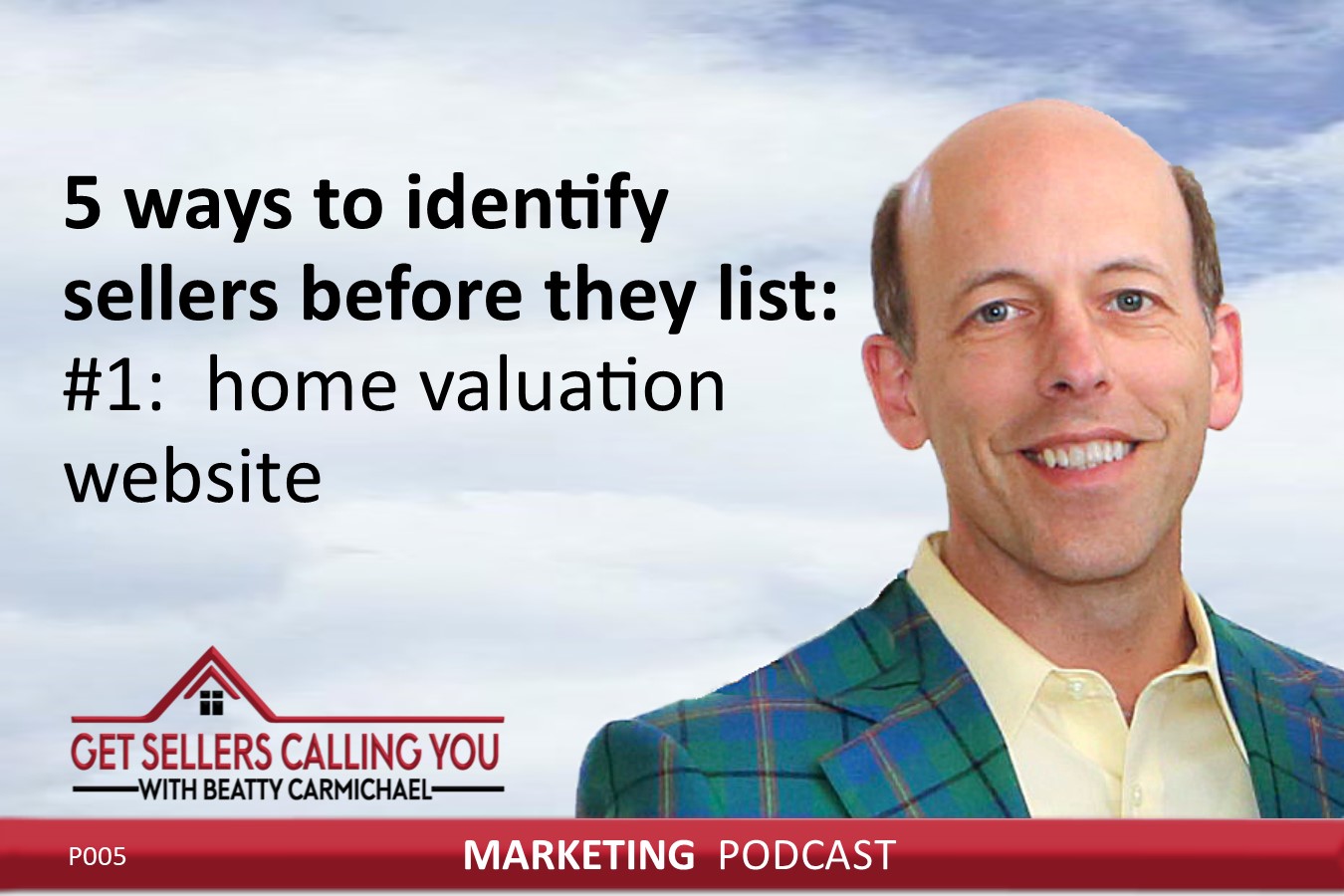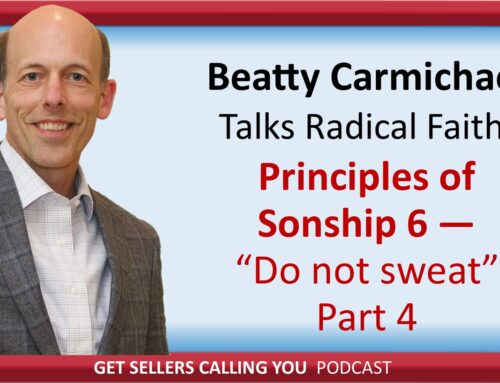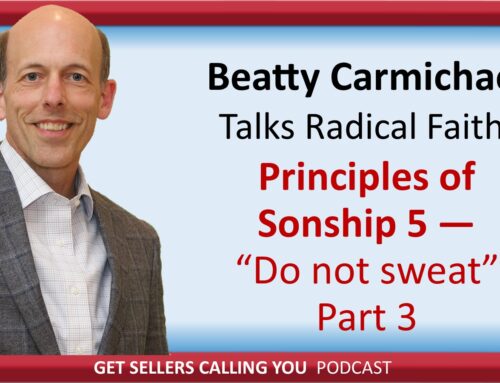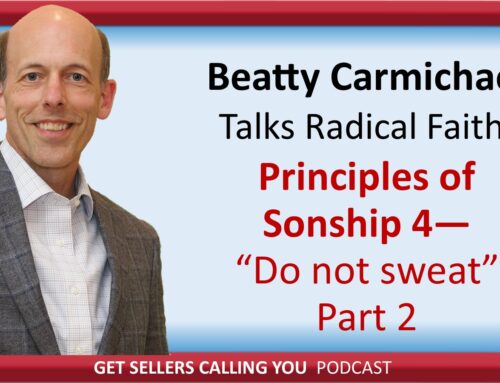Have Questions or Comments? Please ask your questions in the comments section below. We attempt to respond to ALL questions or comments.
Listen via YouTube video if desired
Transcription
Beatty: This is the Get Sellers Calling You Marketing Podcast for real estate agents and I’m Beatty Carmichael. For simple to do proven marketing strategies focused exclusively on finding sellers and getting more listings, visit our website at getsellerscallingyou.com. Now let’s begin our next session of Get Sellers Calling You.
Caroline: Thank you guys for joining us. I’m going to officially welcome you, Beatty.
Beatty: Well, thank you. It’s great to officially be welcomed and to be here.
Caroline: I figured it could be a good idea today to just jump right in. I know there’s got to be a lot of great content. I know there’s more than five ways to identify sellers, but I know you’ve narrowed it down to some five keys. I thought it could be a good idea if we just jumped right in.
Beatty: Okay.
Caroline: If you wanted to maybe give us an overview of what you were going to share about because I have a feeling … Like I said, I know there’s a lot of great content here. We might split this into two calls. Maybe if you want to do an overview of what those five points are, and then we can just dive right in, exploring point one.
Beatty: Yeah, sure. No problem. Let me give you background on that, if I may. The background on all this is sellers are the lifeblood of a thriving, consistent real estate business. Now the old adage, “If you want to last, you’ve got to lift.” You can’t lift without sellers. The question is how do you get sellers? How do you find more sellers? More importantly, how can you find sellers before any other agent knows that they’re a potential seller, so that you can reach out to them first? That’s actually one of the things that when we started this business back in 2012, it was all focused on identifying sellers. Over the years, I’ve learned a lot of things you can do to generate sellers.
Just as a quick overview of what we’re going to talk about on this call, and we’ll probably … If it runs the way that most calls run, I’m going to probably get off topic and off script and come up with sharing item six or seven or even eight in terms of finding sellers, but it’s really a lot of fun. We’re going to talk about the home valuation approach, which is different than the CMA approach. Okay? Don’t get those two confused. We’re going to talk about what I call probably the most powerful thing you can do, which is what I call the I have a client and all of its derivations and modifications to meet the circumstances that you may find yourself in.
We’re going to also talk about what I call a free report, offering sellers something that they will respond to so that they can raise their hand and you identify who they are. We’re also going to talk about a special way of door knocking that makes it really easy to find sellers. Believe it or not, open houses. Okay? That’s the short list of the things that we’ll end up talking about on this call or maybe on this series of calls, as it may go out. Just really dig deep and say, “Here’s how to execute on it step-by-step, so you can take your business right now without going and spending a lot of money with some other company and actually start to identify sellers on your own.” Back to you.
Caroline: Well, great. Yes. I think those are all things too. I feel like a lot of realtors are listening. Those are all things that some of them, they might be familiar with. Some of them, they might not be. I think it’ll be really interesting to dig in and hear more about what you’ve seen be successful and what you know about all those from the marketing side of things. I’m excited to refresh and learn about all of those things. If you want to start, do we just want to start with the home valuation? I think that’s a great place to start. Everybody’s probably somewhat familiar. Might have some kind of home valuation already running on their website, but I know there’s a lot more to it that you would have to share. I think that could be a great point one to start with.
Beatty: Okay. Well then let’s talk on home valuation. Just to be real clear for if there’s someone out there that doesn’t really know what we’re talking about, home valuation website. Okay? It’s a website that you can send someone to and it’ll give them a valuation, an algorithm valuation of their website. Now I wanted to spell a couple of challenges with this right upfront because I think what happens … As I’ve spoken to realtors in the past and recently, a lot of what I’ll call the old time realtors, the ones who have been around for at least 10 or 12 years, they’re professional. They’re tenured. They really have a disdain for any type of home valuation website, especially anything along the lines that even smacks up with Zillow. Okay? What happens is the challenge is a prospect goes there. They get an idea of what their home is worth and now they’re stuck on that price. You’ve got a problem.
Well, I want to dispel this issue because there’s a couple things going on. In fact, let me ask you a question, Caroline. Which would you rather? Would you rather have no sellers in your quiver and no listings or would you rather have a whole bunch of sellers and listings in your quiver and you have to overcome a preconceived idea of what their home is worth?
Caroline: Well, given I’m not a realtor … I hope this is the right answer, but I would think the first would be better, just because the second seems like you might have to have a little more work in convincing them. You’ve already got a preconceived idea that you have to work again.
Beatty: Okay. I can tell I asked the question the wrong way. Let me ask it a little different way that’s a little bit clearer. Would you rather have no business or would you rather have business that you have to overcome a little objection to finalize it?
Caroline: Okay. Yes, now I see. Yes. I would rather have the business where even if you had to overcome a little bit, I’d rather have business than no business.
Beatty: Okay, great. Let’s start with what’s most important because I totally get where a lot of agents come from, that they don’t want to have a potential client get a false expectation of what their home is worth and then they’ve got to battle it. We’ve got two things at stake. Number one is identifying the person who’s actually thinking about selling. Number two, getting the right price on your listing agreement. Okay? The first thing’s first. First thing, you better identify the person because if you don’t, someone else is going to pick up the deal and you completely lost. At least you’ve got a shot if you know who they are, even if you have to overcome a little bit of an issue.
That’s the worst case scenario using a home valuation website to identify sellers is you’ve got to overcome a little bit of an issue in order to make the deal happen right. The consequence on the other side is you have no deal at all. Let’s first look at it that way. The second thing though is go out there and search because there are some really good home valuation websites that accomplish the goal of letting you identify sellers without causing you to give them a wrong expectation of what their home is worth. I wish I remembered the name. A friend and a client of mine uses it, but it’s one of these home valuation websites that does a really excellent job because what it does is it pulls from up to three different home valuation sources.
When someone goes into the website to get a home valuation, it doesn’t just give them a single price. It gives them three different sources, each of them with a range. Okay. One of the houses I put in, it has a range of … One is like 472 to 532. Another valuation has a range of 490 to 505. Another one has a range of something else. What it does is it eliminates the problem that agents have had of saying, “Now that prospect has a wrong idea of the value of their home.” You can overcome these issues if you just dig a little deeper and say, “Let’s find the right type of home valuation website.”
Now with that backed up, let me give one last item for those who still don’t understand how this works. A home valuation website is really someone goes to the website that you purchased from a company. We don’t sell them. Just Google it. They enter the address of their home, so they can get a valuation of their home. As soon as they enter the address of their home, that site logs that address and notifies you that that address has been inserted. Your mindset then is, “Ah. Well, that must be the person who lives there and they must be trying to find out what their value is, which means that maybe they’re thinking about selling.” Now you’ve got a potential seller lead.
Then as that prospect goes deeper into the website, they can adjust things and say, “Well, no. My home isn’t a four bedroom, three bath. It’s a four bedroom, two bath. We did add on. It’s not 2000 square feet. It’s now 3700.” They can actually go in and make all these changes and then recalculate their estimated price range of their home based on adjustments. You will know those people that are making those adjustments. Finally, they can also request a specific pricing analysis. Let’s call it a CMA. Or they can request for you to contact them to give them more information of any sort. Then when they do that, then that now becomes a request.
Okay, that’s how a home valuation website works. The question then is how do you drive traffic there? Just having a website does nothing. You’ve got to start to drive traffic. I think there’s probably three things that are probably the easiest ways to use to drive traffic there. The first one is a Facebook ad, okay? What’s great with a Facebook ad is you can really target where you want to focus your efforts. Think in terms of geographic farming, okay? You live in a city. You don’t want to be driving 20 miles out of the way to manage listings if you can only drive one mile away. With Facebook advertising, you can actually go and you can create an ad. You can run an ad for $5 a week. You control the spend. Once you find that it’s working, then you increase the spend. You can delineate the filters that you want to have, so that you can get as narrowly focused as you want to be.
Let’s say that you want to focus in on a certain zip code. You can put that in. If you want to focus in on any other things … I’m not as familiar with all the filters that you can do with Facebook, but you can filter things. I believe income range, education range, maybe family status if that’s known, age range. All kinds of things that allow you to get more and more narrow specifically to the person you think is going to be a most likely candidate. What that does is it allows your ad to be more targeted, which typically gives you a higher rate of return.
Then what do you put on your ad? My experience is if you’re not careful with this, you will generate what we call false positive leads. A false positive lead is a lead that may be false or positive. Does that make sense? What do you think would be a false lead, Caroline?
Caroline: Maybe somebody that just either incidentally clicked it or maybe somebody that was just interested in what their home was worth, but not necessarily a good lead where they’re thinking about selling.
Beatty: Bingo. That’s it right there. A false lead is a lead that has no interest in selling. A positive lead is a lead that has interest in selling. Here’s the challenge, okay? Let’s say that you are a real estate agent. I know you’re not, but let’s say that you are. You have this super way of identifying the value of a home or providing the value of a home. You want to go through and you want to do geographic farming. You go knocking on everyone’s door and you say, “Hi, I’m Carolina. I’m a real estate agent in the area. Would you like to know the value of your home?” Approximately what percentage of the people you talk to would you think would like to know the value of their home?
Caroline: Oh, definitely over half. I know we’ve discussed this briefly before, but my husband and I, we’ve been living in our home for almost four years and we have no interest in moving any time soon. We love our home. We love our community, but I would be interested to know the value of my home.
Beatty: Yeah.
Caroline: I would say a pretty large majority of people would be interested in that. Like you said, that’s probably casting a net and you’re getting some false leads there.
Beatty: Absolutely. Let me ask the question a slightly different way. By the way, here’s a very important thing to always remember. The key is always asking the right question if you want to get the right answer. When you’re working with prospects, you’re trying to get them to whatever point in the process you want them to come to. You’ve got to ask good questions. Let me ask a question this way. A home is most people’s most valuable asset. Is that correct?
Caroline: Correct. Yes, the majority of people.
Beatty: Okay. Approximately what percentage of people would you think would like to know the current value of their most valuable asset?
Caroline: Oh, gosh. I want to say 100%.
Beatty: Yeah, I would say so too. Okay? If it’s not 100%, it’s pretty darn close. I just want to say it’s a lot more than 50%.
Caroline: Okay.
Beatty: Think about this. You’re knocking on the doors and you’re saying, “Would you like to know the value of your home as your most valuable asset?” Most people are going to say, “Sure.” That doesn’t mean that they have interest in selling. Then because of that, what this means is when you write your ad … Let’s say this is a Facebook ad. You can’t simply say, “Would you like to know the value of your home?” Because simply asking that question is going to get a whole lot of people who want to know the value of their home who have no interest in selling. Are you following that logic?
Caroline: Absolutely. I think that makes complete sense. Everything about when you word something a particular way, you’re going to … Like you said, you’re going to bring in a different net of leads. I think if you worded it in a way that … “If you’re thinking of selling,” or something like that. You’re the marketing genius, but I think you would definitely bring in more qualified leads. People that you’re thinking about that would actually be interested in selling versus just what you said. Close to 100%. All in the wording, no?
Beatty: Not only does that simple wording, “Would you like to know the value of your home?” Not only does it give you a lot of false leads, but you’re paying for every single click. It’s costing you a lot more money. By the way, all of this came out of a lot of testing, okay? We’ve done over 21, split AB marketing test, where you test … You take a list and all you’re doing is changing one element of the test and then seeing which one works best. We’ve done over 21 of those focused primarily around the concept of identifying sellers and eliminating the identification of non-sellers.
What we’ve found is you’ve got to change the wording. The wording might change like this. “If you are thinking about selling your home within the next 12 months, then …” Then the first step is to find out what your home is worth right now. Okay? Something like that. Simply by modifying your headline of the ad, you can start to narrow the number of people who click on it and eliminate more of the false leads, so that you have a higher percentage of positive leads. Is that making sense?
Caroline: Yes, it is. I think that was really good, even just to hear … For everybody on the call, just to hear from you, somebody that’s done a lot of testing in marketing and knows a lot about even just how as simple as just one word difference in the way that you write an ad can make a huge, huge impact in the results. Thank you for sharing that.
Beatty: Yes. There’s also-
Caroline: [crosstalk 00:18:36] Was there anything …
Beatty: Yeah. There’s also something else with that ad, with that wording. In marketing, there’s a concept known as the reticular activator. The reticular activator is that thing that draws attention to something that’s now familiar. Here’s a real simple example. You buy a new car. You’ve never had this type of car before. You don’t see many of them on the road. You think you’re going to like it, so you buy it. Now that you own it, everywhere you look, you see that same car. It’s like they come out of the woodwork. What’s really happened is in the past, you weren’t looking for it, so you never saw it. Now that it’s familiar, you see it everywhere. Does that make sense, what I’m talking about?
Caroline: Yes. My husband and I have joked about that. Recently, we were thinking about getting a new car and that happened. We started seeing it everywhere. The exact make and model. We were like, “What is happening? We’re seeing this everywhere.”
Beatty: That’s right. It’s been there all the time, but you never noticed it. What happens with the reticular activator in marketing, especially as it relates to identifying sellers … This isn’t just for home valuation websites. It’s for everything you do. You call out the attention that you’re looking for the sellers. “If you are thinking about selling your home …” Okay? As just a real simple headline starter. Then what that does is it causes everyone who’s thinking about selling to immediately take notice. If you just simply put, “Want to know the price of your home?” You’ll find some sellers that just gloss right over it because that’s not really on their minds. Now in the back of their mind, it might be if they’re thinking about selling, but it’s not on the forefront.
When you go, “If you’re thinking about selling your home,” all of a sudden, it does something to that reticular activator. It lights up in their mind that says, “Okay. Here is something you need to be doing. You need to reach out and read this ad.” Okay? This is what you’re looking for. You use that reticular activator approach in this ad. I’m just looking at the clock. Wow, I’m going too deep on this. I apologize, but it’s all important.
Caroline: It’s okay.
Beatty: Okay. This may turn into a five-series phone call if I’m not careful, but what I want to do is I want to dig deep into each of these because each of these has so much opportunity and power to drive new listings to an agent’s business if they simply apply it. Let’s go back. We’ve got Facebook advertising, okay? A headline that narrows down the field to just looking for those people thinking about selling so that those other people ignore it more likely. Then you can have them click over. A second thing in using the home value website that you can do is simply flyers. Okay? Put out flyers. When I think of flyers, I think of really door knocking. Okay?
Now we’re in the area of geographic farming. We’re doing best practices. Best practice is you’re in that neighborhood all the time. You door knock it two or three times a year. As you’re door knocking, create some flyers. The flyer will have a similar wording that you do on your Facebook ad, but the great thing about a flyer that you don’t have with Facebook ads is you have a lot more space to really narrow down the field. Here’s what I’ve learned about getting rid of false leads. False leads will get bored quickly if it doesn’t sound like anything that’s interesting to them. When you do a flyer, you can take that headline that we were working on. “If you’re thinking about selling, read this immediately.” That might be the headline.
Then your body copy of that little flyer … I’m thinking like a door hanger flyer. It’s just going to be a couple sentences or a little paragraph. The primary purpose of that paragraph that you write is actually twofold. Number one is to create enough interest to get the person thinking about selling to take action and to create enough boredom and non-interest with someone not thinking about selling that they’re just going to throw the flyer away. That’s all you want. You just wanted to weed them out. It’s what we call self-selection. You want the right people to select themselves.
That simple paragraph might be just a little statement. You know, restating the headline. “If you’re thinking about selling your home any time in the next three weeks to 12 months, the most important thing you need to know is what your home can sell for.” That drives everything else. It drives how much money you’ll keep after your mortgage is paid off. It’ll drive how much money you have for a down payment for the next house, which means it determines what type of house you get in the future. I’ve made it real easy to determine what your home is worth, go to whatsmyhomeworth.com. Or if you’re doing it in geographic farming, let’s say you’re doing it in a community called Morgan Heights. Then I would get a domain that says morganheightshomevalues.com. Something like that. Those domains simply are going to be what’s called … You can get them at Go Daddy. It’s what’s called redirect domain. You just redirect it over to your home value website.
Then that way, you’re out door knocking. You’re meeting people and you’re leaving them that flyer. If they’re not there, you’re simply leaving the flyer on the door. Now those people in that community have a chance to find out what their home is worth. Okay? That’s the second way that you can use it. A third way you can use it is really cool. We talked a lot and just got off a whole series of calls focused on your personal contacts and how to reach out and nurture your personal contacts. Most agents have a list of 100 to 300 people that are past clients, their sphere of influence to other people that they know.
Wouldn’t it be great, Caroline, if you could figure out which of those people were thinking about selling? Think about this. You have a large list of friends. I know already. If you were a real estate agent and you could identify which of your friends were probably going to put their home on the market later this summer, would that be information that you would like to know?
Caroline: Absolutely. Just because I feel like I’ve already earned their trust. We’re friends. We have a relationship. If I knew they were thinking of selling, I would immediately be like, “Well hey, I’m your choice. I’m the right person to list with.”
Beatty: That’s right. Here’s a simple way to do it, okay? They already know you. They already like you. All you have to do is put that same message that you put on the flyer, stick it on a postcard and mail it to them because it’s the same thing. It doesn’t have to be just advertising online. It doesn’t have to be just postcard mailing into a community. It can be mailing directly into your personal list and letting them respond and then you follow up with them. It’s really, really simple. That’s just the first way of finding sellers that we’re going to talk about.
Caroline: Well, I love it. I’m so glad we were able to really spend some time diving in, especially with the home valuation. I think that’s something there’s a lot of talk about. It’s something that a lot of realtors use or like you said, in the beginning are iffy if they want to use it. I think that was really great to learn. There is a right way to use it to bring in the right kind of leads. Thank you, Beatty, for taking the time. It does look like we will have a series of calls. Maybe not five, but a few. Like I said earlier, I think there’s so much great content for us to really dive into. I’m excited to continue on this journey on these top five ways to identify sellers.
Just looking at the clock, I do think we’re about out of time. We’ll need to wrap up. Again, Beatty, thank you so much just for your time and expertise. Yeah, I think we’re going to wrap it up. Then for those of you that are on the live call, if you have any questions-
Beatty: [crosstalk 00:27:02] Can I put an unashamedly plug in before?
Caroline: Absolutely.
Beatty: Okay. All right. These calls are free and you’re welcome to take as much knowledge out of it and go execute on it, but here’s what I’ve learned. A lot of times, you may know what to do, but you’re so busy, you know you can’t really execute on it because of schedule. It’s easy to hear what to do, but then to execute on it yourself is like, “Oh my gosh. Now what do I do? How do I do this right?” If you find yourself in that category, we do have a service that we offer. This is a flagship product that we do and it’s called Agent Dominator. You can see it at agentdominator.net. It’s focused primarily on your personal list, but it can be used on any list, like a neighborhood farm or anything. We do lots of things, of which one of them is identifying sellers for you. Check it out if you have an interest in outsourcing, getting some of these things working for you. Back to you. We’ll close out the call.
Caroline: Okay. Well, great. Yeah. For those of you that are on the live call, if you have any questions that you’d like to ask Beatty, just hold on. As soon as we’re wrapped up, we’re going to go into a short question and answer period. Also at the time, while we’re recording, like I mentioned in the very beginning, we are finalizing our new website. It’s getsellerscallingyou.com and it will be up soon. Be sure to go to that website. We’re going to let you know it’s currently under construction, but we’ll let you know. It’s going to have a lot of great training and resources for free on there. Yeah. Well, thank you so much for joining. I’m going to turn it over to Beatty and open up the call for some question and answers.
Beatty: Great. Thank you.
If you’ve enjoyed this podcast, please tell others about it. Also, be sure to get our step-by-step training on how to double sales and referrals from past clients and sphere of influence. It’s absolutely the easiest way to grow your business fast and it’s completely free. You’ll find it on our website at getsellerscallingyou.com. Thanks for listening.
P005








Leave A Comment